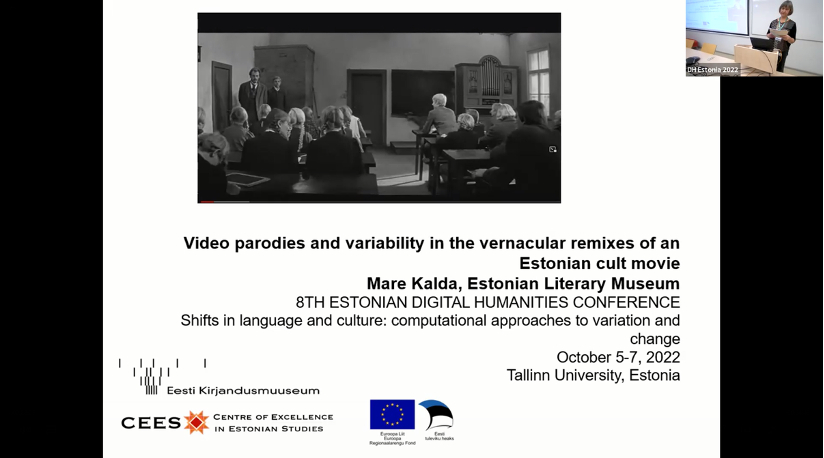
Digital Ethnology and Folklore Working Group
Reports on a special panel, ‘Variation and change in digital folk practices,’ held at the Estonian Digital Humanities conference in Tallinn.
Report: Special panel “Variation and change in digital folk practices” held at DHE 2022 conference „Shifts in language and culture: computational approaches to variation and change“, October 5-7, 2022, Tallinn University, Estonia (https://dh.org.ee/events/dhe2022/)
The SIEF DEF panel materalised as a full one-day event on October 6 as part of the Estonian Digital Humanities conference, and it featured 10 presentations, 3 on site and 7 online (see the conference programme at https://dh.org.ee/events/dhe2022/programme/). It gathered participants from Estonia, Finland, Sweden, USA, Russia, India and Greece. SIEF panel topics ranged from the digital experiences of meme-makers, social media photographers, gamers and schoolchildren, among others. It covered digital iterations of local Estonian humour, viral responses to the War in Ukraine, tourism, religion and urban activism. Discussions pondered on questions of authority, methods, and ethical dilemmas. SIEF DEF members were invited to take part in the full event, and were not charged the conference fee (otherwise: regular fee 30, late fee 50 euros). The panel presentations will be soon made available as recordings on the conference website and there will be links to most of the panel presentation slides.
This event was held in cooperation with the yearly 8th Estonian Society for Digital Humanities (see https://dh.org.ee for more information on past conferences) in Tallinn University, Tallinn, Estonia. The conference took place as a three-day event, on October 5 - October 7, 2022, with two days reserved for presentations, three keynotes, and the third day dedicated to workshops. The full event counted about 55 participants in total (online and on site). Among the keynote speakers was professor Coppelie Cocq, one of the chairs of SIEF DEF working group, who delivered a talk entitled "Sustainable (data) relationships and responsibility in DH research. Questioning ownership and accessibility in the age of Open Science" (see https://dh.org.ee/events/dhe2022/keynotes/coppelie-cocq/). CUDAN at Tallinn University supported her travel to Tallinn as well as accommodation on site. The conference received substantial support from Estonian Literary Museum (covering the costs of printed materials, part of the technical solution of the hybrid conference, catering for coffee breaks etc), Estonian Cultural Endowment, Tallinn University (reduced costs for conference facilities - rooms, equipment) and Estonian Society of Digital Humanities, side by side with SIEF.
The SIEF DEF working group panel was organised as an online event to ensure that all the DEF members who wished could participate and also in order to make the event more inclusive, ie to allow for participation from lower-income countries and to make the conference available in the context of the global pandemic. Members of the DEF working group held a meeting after the panel presentations, inviting all participants to suggest themes for the upcoming SIEF congress. The SIEF DEF working group decided to come forth with two panel proposals for SIEF 2023 in Brno.




